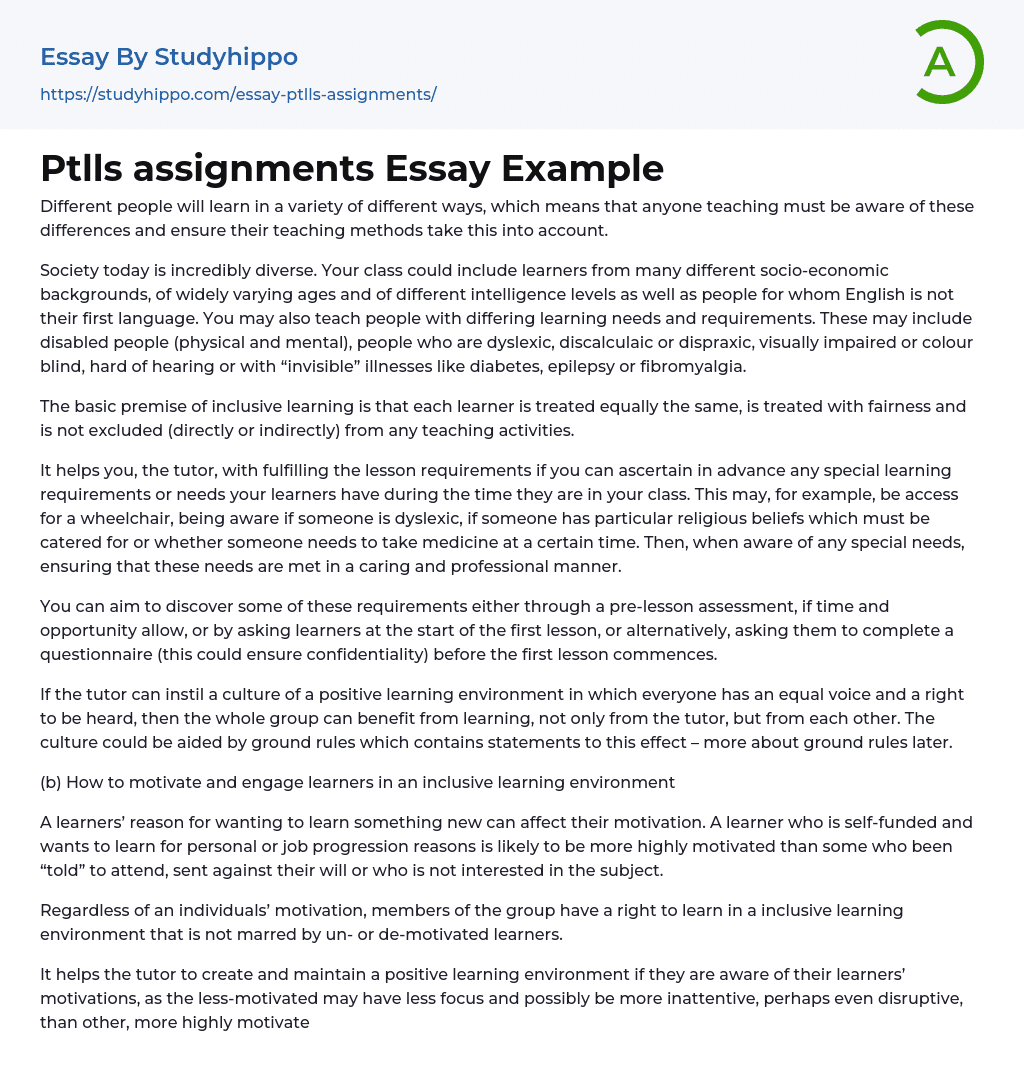It is important for teachers to acknowledge that people have varying styles of learning and adjust their teaching approaches accordingly.
In today's society, there is a wide range of diversity. This is evident in the classroom where students come from various socio-economic backgrounds, different age groups, and have varying levels of intelligence. Furthermore, there may be students who are non-native English speakers or have diverse learning needs and requirements. These needs can include disabilities such as physical or mental impairments, dyslexia, discalculia, dispraxia, visual impairment, color blindness, hearing impairments, or "invisible" illnesses like diabetes, epilepsy or fibromyalgia.
Inclusive learning is based on the idea of treating every learner equally and fairly, without any discrimination or exclusion (whether direct or indirect) from teaching activities.
Recognizing a
...nd addressing the special learning requirements or needs of learners in class is crucial for tutors. These needs can range from wheelchair accessibility to dyslexia, specific religious beliefs, or the need for medication at a specific time. Once these needs are identified, it is essential to handle them with care and professionalism.
There are different ways to identify these requirements. One possibility is to conduct a pre-lesson assessment, if there is sufficient time. Another approach is to ask about learners' needs at the beginning of the first lesson. Alternatively, you can have them complete a questionnaire before the initial lesson begins to ensure confidentiality.
To enhance the group's learning experience and maximize the tutor's expertise, it is beneficial to create a positive environment that encourages equal participation and respect for all opinions. Establishing ground rules that highlight these principles can help cultivate this culture
– more details on ground rules will be given later.
(b) Strategies to motivate and engage learners in an inclusive learning environment.
The motivation level of a learner can be affected by their desire to acquire new knowledge. If a learner is financing their own education and has personal or career development objectives, they will probably have higher motivation compared to someone who is obligated to attend or lacks interest in the subject matter.
In order for all group members to have an equal opportunity to learn in an inclusive environment, it is important that they are not affected by individuals who lack motivation or enthusiasm, regardless of their own level of motivation.
Tutors need to comprehend their learners' motivations in order to establish a positive learning environment. It is vital because learners with lower motivation often lack focus and may exhibit more disruptive or inattentive behavior compared to highly motivated classmates.
It is essential for the tutor to determine if a learner's motivation is intrinsic or extrinsic. This understanding aids in establishing a positive learning environment that accommodates all students.
The motivation of learners may be influenced by various factors, including their perception of the subject's interest or usefulness, their desire to achieve a goal, their current abilities, self-confidence, self-esteem, and determination to succeed.
It is important to remember that each learner may be motivated or de-motivated by various factors.
The use of Abraham Maslow’s Hierarchy of needs (1954) can aid in comprehending motivation theory.
In order for learning to occur, it is important to address the physiological needs of learners. This entails creating a safe and
secure learning environment in education.
The tutor can take several actions to assist with learners' motivation:
When teaching, it is vital to maintain professionalism and respect for everyone. It is crucial to establish clear learning objectives from the start and create an organized environment that promotes effective learning. The activities provided should be diverse, appropriate, and beneficial for the learners. Furthermore, incorporating various teaching styles can also yield advantages.
Regularly provide positive and constructive feedback, while avoiding the creation of an excessively competitive atmosphere.
Understanding the importance of attention spans is crucial as it determines how long a learner can stay focused without being distracted. Short-term attention can only be maintained for a shorter time compared to long-term attention. According to Cornish and Dukette (2009), most adults can concentrate on one task for around 20 minutes before shifting their focus to another task for an additional 20 minutes. Factors like hunger, illness, and fatigue can impact this ability. To keep learners engaged, interested, and involved, it is necessary to provide various short tasks and activities. Ultimately, creating a secure and supportive learning environment plays a vital role in promoting inclusive learning where learners feel comfortable, valued, involved, and safe.
- Academia essays
- Higher Education essays
- Language Learning essays
- Studying Business essays
- Education System essays
- Study essays
- First Day of School essays
- Scholarship essays
- Pedagogy essays
- Curriculum essays
- Coursework essays
- Studying Abroad essays
- Philosophy of Education essays
- Purpose of Education essays
- Brainstorming essays
- Educational Goals essays
- Importance Of College Education essays
- Brown V Board of Education essays
- The Importance Of Higher Education essays
- Online Education Vs Traditional Education essays
- Academic And Career Goals essays
- Academic Integrity essays
- Brown Vs Board Of Education essays
- Distance learning essays
- Technology in Education essays
- Vocabulary essays
- Writing Experience essays
- Importance of Education essays
- Early Childhood Education essays
- Academic Degree essays
- Academic Dishonesty essays
- School Uniform essays
- Academic writing essays
- Cheating essays
- Bachelor's Degree essays
- MBA essays
- College Life essays
- Grade essays
- Diploma essays
- Phonology essays
- Sentence essays
- Filipino Language essays
- Pragmatics essays
- Millennium Development Goals essays
- History Of Education essays
- Graduate School essays
- Middle School essays
- School essays
- Special Education essays
- University essays




